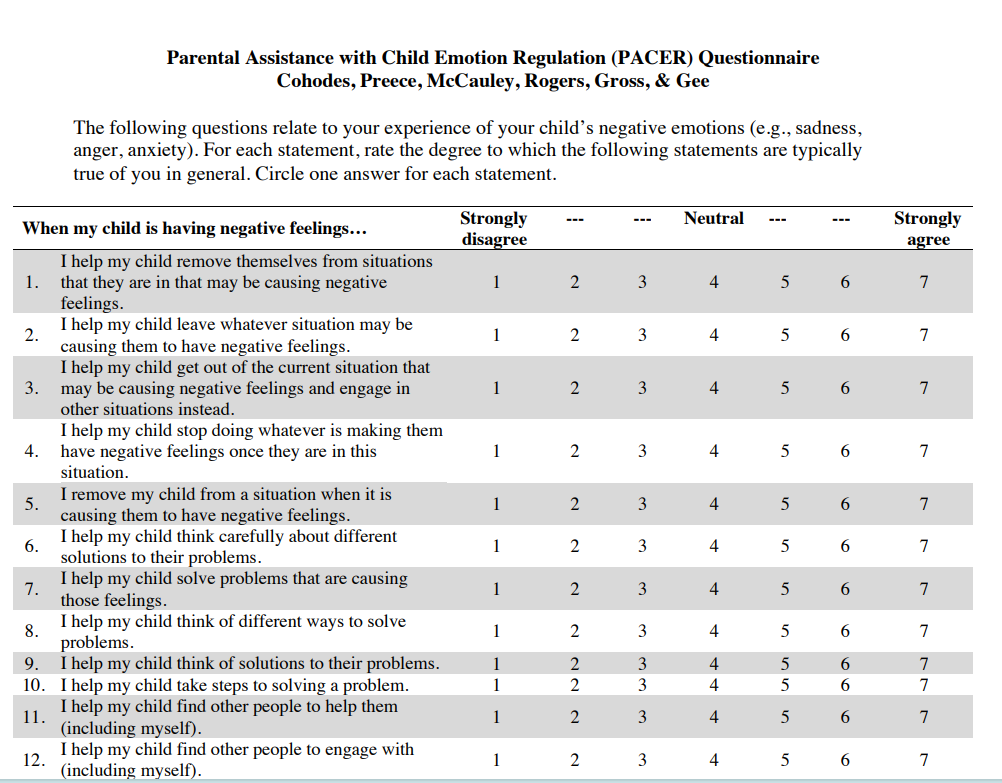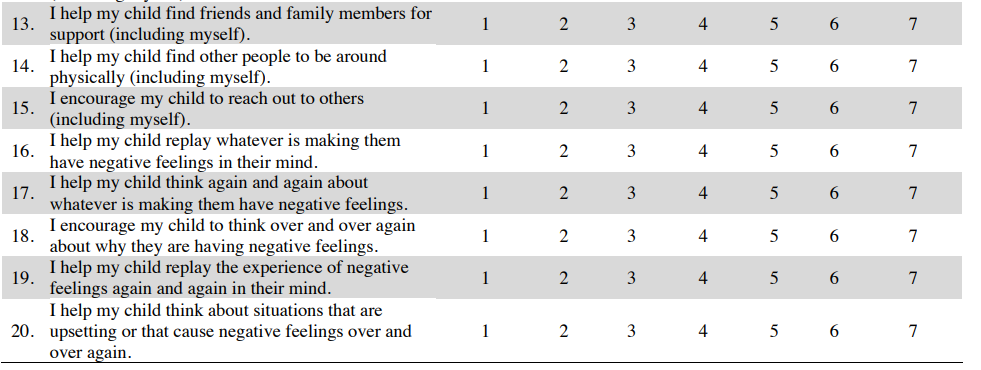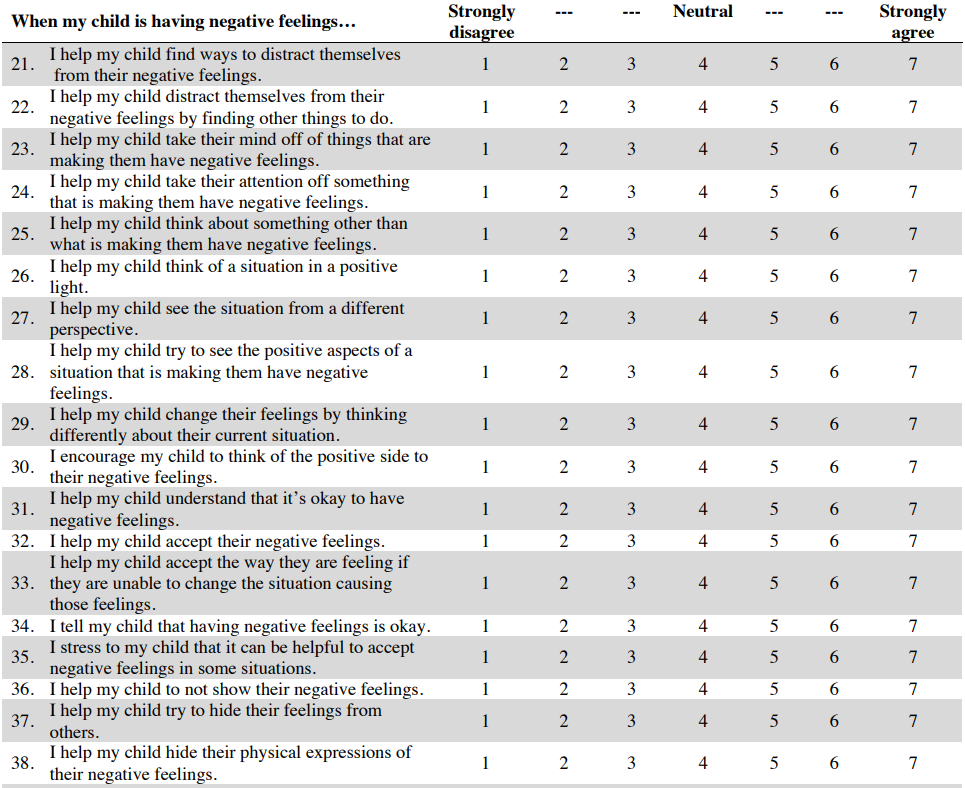Family Partners for Research Study
Formative Data Collections for ACF Research
Instrument 2 - Remote Child Well-Being Assessment by Parent Report_revised_6.27.24_Clean
Family Partners for Research Study
OMB: 0970-0356
Instrument 2 – Remote Child Well-Being Assessment by Parent Report
OMB# 0970-0356, Expiration date 01/31/2027
Family Partners for Research Study
Instrument 2: Remote Child Well-Being Assessment by Parent Report
Contents
1. QP – INTRODUCTION TO THE STUDY 2
2. CHILD DEVELOPMENTAL STATUS: DAYC-2 MODULE 4
3. CHILD FUNCTIONING STATUS: VINELAND-3 MODULE 4
4. CHILD SOCIAL-EMOTIONAL WELL-BEING: BASC-3: BESS MODULE 4
5. PARENTING STYLE: PACER MODULE 5
QP: Q=Question; P=Parent
P_QP_BGN [ PQP_BGN ] NoDeliv
CASE ID : ^main_case.zrid
Subject: ^main_case.subject
Adult: ^main_case.ad_last ^main_case.ad_first
Child: ^main_case.childfirst
Child’s age: ^AgeYY
Child’s sex: ^Global.sex
IF INFORMATION ABOVE IS CORRECT, PRESS “1” AND ENTER TO CONTINUE.
IF INFORMATION ABOVE IS INCORRECT, CLOSE THE INTERVIEW TO RETURN TO CMS.
Continue 1 Continue
Thank you for your interest in participating in a study to inform possible future data collections for the National Survey of Child and Adolescent Well-Being (NSCAW). NSCAW is a study on the experiences of children and families who have had contact with the child welfare system (CWS). This NSCAW sub-study, called Family Partners for Research, focuses on understanding the possible questions that could be included in a future survey and how to engage participants in possible future studies. Both this sub-study and NSCAW are funded the by the Administration for Children and Families (ACF) and carried out by RTI International.
Please read the following informed consent statement.
What does the Family Partners for Research Study involve?
We are inviting you to participate in a survey in two ways at two different times: Time 1: remotely (online and by telephone); and Time 2: in-person (with an interviewer). After each survey, we will ask you to provide feedback. We will be contacting about 70 family mentors to participate in a survey and provide feedback on the way information is collected. You can receive up to $150 as a token of appreciation for taking part in this study and your child will receive a $10 token of appreciation for their participation during the in-person visit.
Time 1: You will complete an online survey and a telephone survey about your child. The survey includes questions about your child’s well-being, including their communication, learning, emotions, and behaviors. Afterwards, you will provide feedback about the survey questions online. The survey and feedback questionnaire will take about one hour and fifteen minutes. The exact length depends on the age of your child and other factors. You will receive a $50 virtual gift card as a token of appreciation. If you need any assistance accessing this online survey, an interviewer will be available to provide support by phone.
PAPERWORK REDUCTION ACT OF 1995 (Pub. L. 104-13) STATEMENT OF PUBLIC BURDEN: The purpose of this information collection is to gather feedback to inform future National Survey of Child and Adolescent Well-Being data collections. Public reporting burden for this collection of information is estimated to average 1 hour per respondent, including the time for reviewing instructions, gathering and maintaining the data needed, and reviewing the collection of information. This is a voluntary collection of information. An agency may not conduct or sponsor, and a person is not required to respond to, a collection of information subject to the requirements of the Paperwork Reduction Act of 1995, unless it displays a currently valid OMB control number. The OMB is #0970-0356 and the expiration date is 01/31/2027. If you have any comments on this collection of information, please contact Melissa Dolan: [email protected]. |
Time 2: Two weeks later, an interviewer will come to your home to complete an in-person survey with you for 30 minutes. The interviewer will also observe your child during a play session for another 30 minutes, for which they will receive a $10 virtual gift card as a token of appreciation. Right after the in-person survey, we will ask you to complete a follow-up interview where you will be asked to provide any feedback you have on your experience completing the activities, study materials, as well as any suggestions or questions you have. This will take about 45 minutes. As a token of appreciation for your participation completing the in-person survey and this interview, you will receive a final $100 virtual gift card. The feedback you provide on your experience will help inform how we administer NSCAW to other parents in the future.
How will this information be used?
The project team will explore any potential differences between conducting these types of surveys in-person vs. online. This information may be used to inform the way NSCAW data could be collected in possible future studies. The feedback you provide on your experiences and suggestions will help shape how we administer any possible studies in the future with other parents. This includes how we provide consent and information about the study, the length of the survey, the types of questions asked, and the general look and feel of the survey.
With your consent, the project team may include anonymous quotations from you in a study report, presentation, or other written material where we describe information we learned. However, we will not include your name or any other personal information about you in these quotes, which will remain anonymous. The use of anonymous quotes allows us to accurately communicate your suggestions and feedback without having it be associated with your name.
How will my information be protected?
All your personal information will be kept private as permitted by law– only the project team will have access to it and will only use it for contacting purposes. This includes your name, address, email address, child’s name, and child’s age. We keep your answers on a secured computer and do not identify you or your child by name. We combine your answers with the answers from other family mentors participating in the study and report our results only in summary form. All staff involved in this research have signed an RTI Confidentiality Agreement. At the end of the study, only the de-identified data will be shared or transferred for research purposes. De-identified data means that any names and contact information have been removed.
A Certificate of Confidentiality (CoC) covers this research. A CoC helps protect your identifiable and private information from all legal proceedings. Unless you consent, information from this research study that identifies you will not be shared outside this study..
What are my rights?
Participation is voluntary and you can decide to take part in this study or not. You can skip or refuse to answer any questions without any consequence. Taking part in this study does not affect any benefits you or your child may receive.
Is there any risk in me taking part?
Although the purpose of your participation is to receive your feedback, there is the potential for uncomfortable feelings to come up when answering questions about your child that are out of our control. The survey does not ask sensitive questions and therefore the project team does not anticipate any distress or uncomfortable feelings will arise.
There is a chance your information could be seen by someone who shouldn’t have access to it. We are minimizing this risk by making sure the interviews take place in a private location, and by keeping your answers on a password-protected computer separate from any names and contact information.
Is there any benefit in me taking part?
Although there is no benefit to you, personally, the information gathered will inform future data collection efforts with families who have contact with the child welfare system.
Token of Appreciation
You can receive up to $150 as a token of appreciation for your participation, and your child can receive a $10 gift card.
Who is conducting the study? Who can I talk to about it?
RTI is conducting this study. The Administration for Children and Families (ACF) is funding this study. If you have any questions or concerns about the study, you can contact the Study Coordinator, Natasha Aranguren, by email ([email protected]) or phone (917-650-2707). If you have questions about your privacy rights as a study participant, you can call RTI’s Office of Human Research Protections toll-free at 1-866-214-2043.
What else do I need to know?
If you feel upset when you take part in this study and would like to talk with someone about your feelings, we suggest you call your current clinician or reach out to another provider or organization. If you don’t have a clinician, we encourage you to call the National Parent Helpline: 1-855-427-2736 (Call or Text); email: [email protected].
Research Participant Statement
I understand that taking part in this study is voluntary. I can refuse to participate or drop out at any time.
Do you agree to take part in the study?
[1] = Yes, I agree to take part in the Family Partners for Research Study.
[2] = No, I do not agree to take part in the Family Partners for Research Study.
Let's begin.
Source: Developmental Assessment of Young Children, Second Edition (DAYC-2): by Judith K. Voress and Donal D. Hammill; Pearson; copyright 2013. Standardized assessment tool measuring development through three scales: cognitive, communication, and social-emotional.
For use in the online parent report and with children aged 2-5 in person.
Source: Vineland Adaptive Behavior Scales, Third Edition (Vineland-3): Sarah S. Sparrow, Domenic V. Cicchetti, Celine A. Saulnier; Pearson; copyright 2016. Standardized assessment tool measuring abilities and functioning through two scales: a Communication Scale containing Expressive, Receptive, and Written items, and a Daily Living Skills Scale containing Personal, Domestic, and Community items.
For use in the online and in-person parent report.
Source: Behavior Assessment System for Children, Third Edition, Behavioral and Emotional Screening System (BASC-3 BESS): Randy W. Kamphaus, Cecil R. Reynolds; Pearson; copyright 2015. Standardized assessment tool measuring emotional and behavioral strengths and problems in children.
For use in the online and in-person parent report.
For use in the online and
in-person parent report.





| File Type | application/vnd.openxmlformats-officedocument.wordprocessingml.document |
| Author | Domanico, Rose |
| File Modified | 0000-00-00 |
| File Created | 2025-05-29 |
© 2026 OMB.report | Privacy Policy